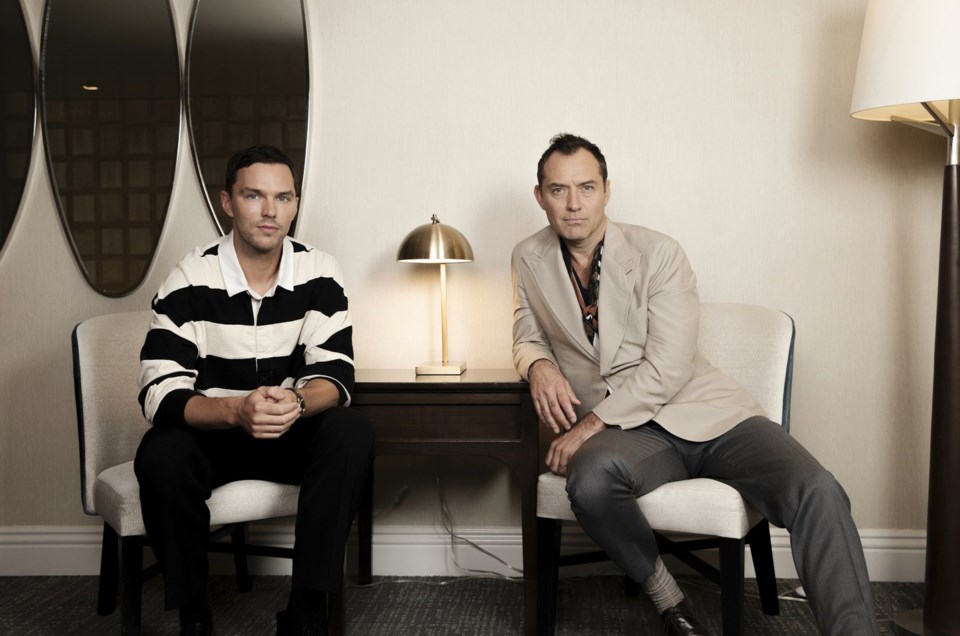Forty years ago, on Dec. 8, 1984, one of the largest manhunts in FBI history came to an explosive end on Whidbey Island in Puget Sound. The person they were after was Robert Jay Mathews, the leader of a white supremacist group committing armed robberies to finance plans to overthrow the government. The standoff lasted more than 30 hours.
It’s a dramatic episode in history that’s chronicled in the new film “The Order,” in theaters Friday, a 1970s-styled thriller starring Jude Law as an FBI agent who connects the dots of the violent crimes arising in the Pacific Northwest and Nicholas Hoult as the enigmatic Mathews. The group, responsible for the murder of Jewish radio talk show host Alan Berg, and that infamous showdown, also continues to resonate with some on the far right, who make pilgrimages to Whidbey Island this time of year for “Martyr’s Day.”
Neither the English stars nor the Australian director Justin Kurzel were familiar with the history of the group when they first read Zach Baylin’s script, based on Kevin Flynn and Gary Gerhardt’s nonfiction book “The Silent Brotherhood.” But it felt full of potential for an entertaining, complex movie, with car chases, bank heists, shootouts and pathos.
“It just reminded me of the great old heist films from the '70s, with a Sidney Lumet, William Friedkin kind of feel about it,” Kurzel said. “Even though it’s a period film, it’s so incredibly present and sort of dangerously still relevant.”
That relevance would soon become even clearer. Three months after Kurzel got the script, he watched the Capitol riot unfold on Jan. 6, 2020, and spotted someone holding a copy of “The Turner Diaries,” one of Mathews' major inspirations. And yet it would be an uphill battle to get the film both made and into theaters, now a semi-miracle for an independent production.
“It’s always been a battle to get this kind of film made. You really need to find champions for it,” said Law, who also signed on to produce with his company Riff Raff. “The historical story is all wrapped up in this film in a genre. It’s got a very crowd-pleasing energy to it. It’s edge of your seat, cat and mouse. It harkens back to those incredibly successful films in the ‘70s and ’80s that people would go to and be seen as kind of blockbusters … it’s funny that those films don’t always necessarily get the budget they should nowadays.”
One of Law’s favorite qualities of the script was that it was written with neither empathy for nor judgement of Mathews or his followers. But that’s not to say that bringing him to life was straightforward. For Hoult, it was a daunting task.
“To play a character like that, you have to try and understand them as best as possible,” Hoult said. “To do that, you have to figure out their way of living and also what made them the way they are. That means taking in a lot of the information that they would have taken in that shaped their ideology and beliefs, which is a horrible place to go to because it’s not stuff that you necessarily want filling your every day and to have those thoughts flowing through your head.”
But Hoult felt safe with Kurzel, a director he’d worked with on “The True History of the Kelly Gang.” He was also looking forward to collaborating with Law, though they weren’t exactly hanging out during the shoot. Kurzel asked Law and Hoult to stay away from one another until their characters meet in the film to add a dynamism to that scene.
“It was an adrenaline that you can’t fake,” Hoult said.
Unbeknownst to Hoult, Kurzel also told Law to follow him around one day in Calgary — a tactile assignment that he knows sounds a little crazy but that sometimes unlocks real things for actors.
“It wasn’t hugely eventful,” Law laughed, but he saw its benefits. “Justin writes up for his actors manifestos and sets them tasks. He’s not precious about it. He says, do it or don’t do it. I think we both found them really interesting and really helpful ways in to just kind of embodying these people that you’ve got to become.”
As with all independently made films, they didn’t always have the time or money they would have liked, but they made it work.
“Each bank heist or armored truck robbery was basically done in a day,” Hoult said. “The speed you’re going and the frantic energy of that is helpful for creating what ends up on the screen, the chaos of that.”
And up until the last minute, they were even contemplating rewriting the famous final showdown. There was a total fire ban in Alberta because of wildfires, but it lifted just in time.
“We were very lucky,” Kurzel said of the showstopper moment.
The film premiered earlier this year at the Venice Film Festival and has since played at several others, which has allowed everyone the rare privilege of seeing many responses to what they’ve made. And it's been overwhelmingly positive.
“This has happened before, that you make something you believe in, you love it and it just disappears or no one gets it. And you realize so much of it has to do with timing and impact,” Law said. “But it feels like people really appreciate what we’ve tried to do, and they really get it.”
Lindsey Bahr, The Associated Press




